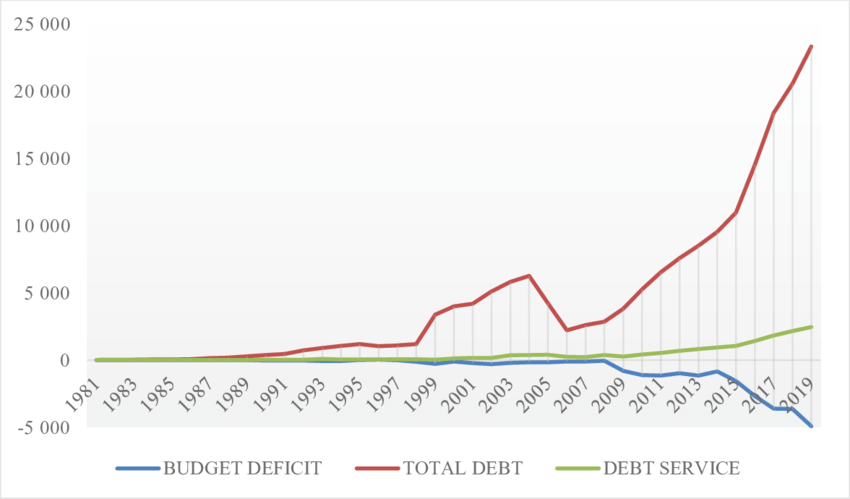Nigeria’s debt profile has jacked up to N81 trillion following the latest Naira devaluation by the Central Bank of Nigeria (CBN).
Daily Trust reports that the CBN on Wednesday officially unified all segments of the forex exchange (FX) market.
The devaluation saw the dollar, which exchanged at N430 as at the end of the first quarter when the Debt Management Office last published our national debt profile, shot to N664/$ at the close of trading at the import and export window yesterday.
The devaluation automatically increased the Naira component for debt service by N9 trillion.
The DMO recent statement noted that, “As of December 31, 2022, the Total Public Debt Stock was N46.25 trillion or USD103.11 billion. This amount is not inclusive of the recently approved conversion of the N27tr ways and means loan by the National Assembly, which brings the new total to over N72 trillion.
Fuel subsidy removal: NEC recommends palliatives for workers, vulnerable
INEC tenders Tinubu’s biodata form, BVAS report for 36 states, FCT
In 2020, the devaluation of the Naira increased the nation’s total debt profile by about N1 trillion.
“In terms of composition, total Domestic Debt Stock was N27.55 trillion (USD 61.42 billion) while Total External Debt Stock was N18.70 trillion (USD 41.69 billion).”
When Daily Trust multiplied the total external debt stock by the new exchange rate, it revealed that an additional N9 trillion will be required to procure the foreign exchange needed to service our debt.
In the same vein, Africa tax lead at PriceWaterhouseCoopers, Mr Taiwo Oyedele noted that there will be a corresponding increase in debt service cost concerning foreign debt service.
He also predicted a possible reduction in the budget deficit if the government’s forex revenue exceeds foreign currency obligations but added that an increase in the budget deficit will occur if otherwise.
Furthermore, Oyedele predicted a possible impact on the pump price of petrol inching closer to the current pump price of diesel as a result of the current policy.
“Moreover, it is expected that the country will attract forex inflows, especially from portfolio investors, foreign direct investors (FDI), and exporters’ proceeds and diaspora remittances. Furthermore, the capital market is expected to benefit from the unification of exchange rates as the market which has been rising significantly is likely to appreciate further as foreign investors move in to take position,” he further explained.
Dollar-denominated component of the 2023 budget unimplementable – Experts
Reacting to the development, a professor of capital market, Prof Uche Uwaleke said: “Much as it will have the effect of increasing the monthly FAAC allocation to the federal and sub national governments, it has equally rendered unimplementable the dollar-denominated component of the 2023 budget including the recurrent spending in respect of debt service,”
Speaking further, he said “In the 2023 budget, for example, about N6.3 trillion was earmarked for servicing both domestic and external debt. Following naira devaluation, the cost of servicing external debt in naira terms will surge. Overall, naira devaluation will increase the size of the country’s debt stock in naira terms, given that the rate of converting the external debt component to the naira is now higher.”
Prof. Uwaleke added that the devaluation also increases the opportunity cost of servicing external loans in dollars when considered in naira terms. By implication, the country will lose more naira now than previously each time foreign loans are serviced in dollars.
“Given the usual volatility associated with market forces on which the fate of the naira now hangs, less resort to external loans in financing budget deficits is recommended going forward National Debt likely to hit above N77 trillion by end of 2023 and is arguably unsustainable at current Tax/Revenue to GDP and Debt service payments ratios and expenditure patterns,” he further explained.
Also, Paul Alaje, Senior Economist with SPM Professionals in his analysis said: “Looking at the foreign component of Nigeria’s debt and the conversion to naira, Nigeria devalued and borrowed in dollars that itself will make our debt profile to increase,” he said.
“Interestingly, Nigeria will still service this debt at the same dollar rate it borrowed the money because the rate of servicing has not reduced.” He added.
The economist advised the government to moderate commercial borrowings, which would always increase in value and usually not be forgiven.
Policy will increase investors’ confidence – MAN
Reacting to the development, the Director General of the Manufacturers Association of Nigeria (MAN), Segun Ajayi-Kadir, said floating the naira would increase market efficiency and help return investors’ confidence in the economy.
Kadir said the float remains an important step towards resolving the crisis rocking Nigeria’s forex market as the official exchange rate is now almost at par with the market-determined rate.
“Therefore, the move to adopt a unified exchange rate is a welcome idea to resolve the problem of foreign exchange in the country. We are hopeful that the floating of the naira will restore sanity in Nigeria’s forex market and advised members to see this new development as a long-awaited opportunity to soften the lingering challenges of the forex crisis rocking the forex market.”
He emphasised that the scarcity has been a hindrance to the manufacturing sector as getting it at the official rate has been quite difficult with its members struggling to get it through alternative means at an exorbitant and uncompetitive rate.
“It is good to also note that the unavailability of forex for the manufacturing sector is one aspect of several challenges mitigating against manufacturers. Given a floating system, we are optimistic that the official and parallel market rates will eventually converge and will create headroom for investors to seamlessly have access to forex at a competitive rate” he added.
By Sunday M. Ogwu, Philip S. Clement, & Farouk Shuaibu

 Join Daily Trust WhatsApp Community For Quick Access To News and Happenings Around You.
Join Daily Trust WhatsApp Community For Quick Access To News and Happenings Around You.


